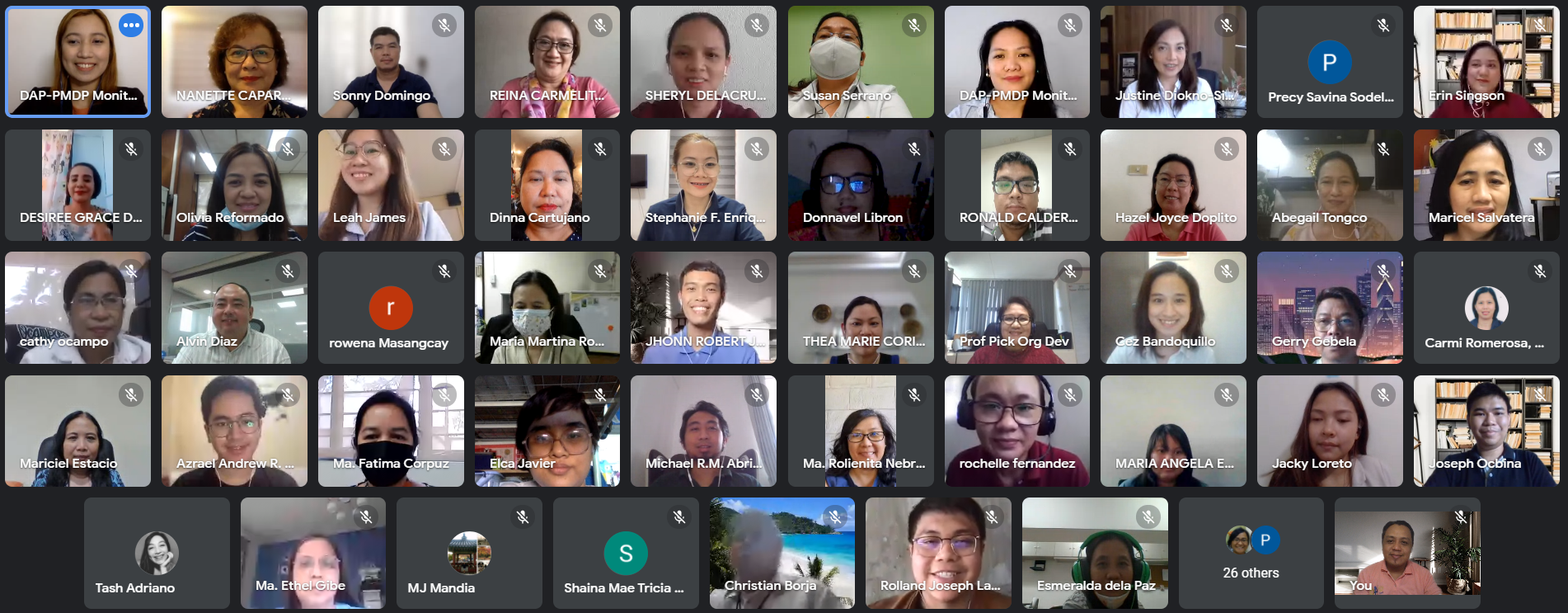
PMDP conducted a briefing for human resource managers-partners for its Outcome Evaluation Project to be spearheaded by the PIDS last 14 June 2021, Monday.
PMDP Managing Director Nanette C. Caparros jumpstarted the session with an opening message recalling the Process Evaluation of the program that transpired in 2016 which was likewise done by PIDS. She shared that the results of the said assessment became the basis for PMDP’s reinforced value as the National Government’s Career Executive Service Development Program (NGCESDP) and design upgrades. In connection to that, she announced that a larger scale evaluation will be run by the same institution to gather evidence on the attainment of the program objectives and drive even better designs leading to even better results. HR managers, as key people for data generation will be of big help to make this initiative a success, she added.
PIDS fellow Dr. Sonny N. Domingo, Principal Investigator of the project remarked that with him in their team will be two other fellows Co-Principal Investigators Dr. Charlotte Justine Diokno-Sicat and Dr. Michael Ralph M. Abrigo, their Research Analyst, John Joseph S. Ocbina and the People Dynamics Inc. team as their official survey firm.
Dr. Domingo explained that the 2016 Process Evaluation had focused on the curriculum’s content and implementation initially, while the upcoming evaluation will have a bigger engagement as this will go around the actual impacts of studying in PMDP, hence, requiring more quantitative and documentary inputs. Using infographics, he showed the result of the previous study to showcase the transition to intermediate and final outcomes as the Outcome Evaluation’s scope.
The briefing proceeded with a discussion of the methodology, the Quasi-Experimental technique, by Dr. Michael Ralph M. Abrigo. He shared that they are going to apply the Statistical Matching approach, wherein HR managers will be asked to connect with and gather possible individuals who are comparable to the PMDP graduates at the time of their application to PMDP to form the ‘control’ group.
The selection criteria include salary grade, trainings attended, period and span of service before applying in PMDP, and other observable characteristics, considering the “Difference-in-Difference” treatment. He left a remark towards the highlight of his segment saying, “What will be left is the effect of PMDP on the outcome of the graduates, and from there, we should be able to identify that this one difference was an impact of the Academy to the scholar”.
Co-Principal Investigator Dr. Justine Diokno-Sicat, on the other hand, expounded on the Data Collection Instruments that they are going to use, and other indicators of important information to assess the graduates and their comparable individuals, and to properly address PMDP’s objectives.
An open forum with very active participation from the audience ensued after the presentations. Most of the attendees requested for a complete listing of the PMDP alumni in their agencies.
In closing, Managing Director Caparros thanked the PIDS team, the PMDP team and most especially the HR managers who found time to attend the virtual gathering. She expressed hope that the study will gather support from the attendees considering the scope and scale of PMDP.



